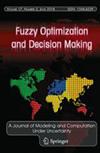A comparative study on precision of pairwise comparison matrices
IF 7.4
2区 计算机科学
Q1 COMPUTER SCIENCE, ARTIFICIAL INTELLIGENCE
引用次数: 0
Abstract
Abstract Pairwise comparisons have been a long-standing technique for comparing alternatives/criteria and their role has been pivotal in the development of modern decision-making methods such as the Analytic Hierarchy/Network Process (AHP/ANP), the Best-Worst method (BWM), PROMETHEE and many others. Pairwise comparisons can be performed within several frameworks such as multiplicative, additive and fuzzy representations of preferences, which are particular instances of a more general framework based on Abelian linearly ordered groups. Though multiplicative, additive and fuzzy representations of preferences are widely used in practice, it is unknown whether decision makers are equally precise in the three aforementioned representations when they measure objective data. Therefore, the aim of this paper is to design, carry out and analyse an experiment with over 200 respondents (undergraduate university students) from two countries, Czechia and Italy, to compare precision of the respondents in all three representations. In the experiment, respondents pairwise compared (by approximation) the areas of four geometric figures and then, the imprecision of their assessments was measured by computing the distance with the exact pairwise comparisons. We grouped the respondents in such a way that each participant was allowed to deal with a unique type of representation. The outcomes of the experiment indicate that the multiplicative approach is the most precise.

两两比较矩阵精度的比较研究
摘要:配对比较是一种长期以来用于比较备选方案/标准的技术,其作用在现代决策方法的发展中至关重要,如层次分析/网络过程(AHP/ANP),最佳-最差方法(BWM), PROMETHEE等。两两比较可以在多个框架中执行,例如偏好的乘法、加法和模糊表示,它们是基于阿贝尔线性有序群的更一般框架的特定实例。尽管偏好的乘法、加法和模糊表示在实践中被广泛使用,但决策者在测量客观数据时,上述三种表示是否同样精确尚不清楚。因此,本文的目的是设计、实施和分析来自捷克和意大利两个国家的200多名受访者(本科生)的实验,以比较受访者在所有三种代表中的精度。在实验中,被调查者两两比较(通过近似)四个几何图形的面积,然后,通过计算精确两两比较的距离来测量他们评估的不精确性。我们以这样一种方式对受访者进行分组,即允许每个参与者处理一种独特类型的代表。实验结果表明,乘法法是最精确的。
本文章由计算机程序翻译,如有差异,请以英文原文为准。
求助全文
约1分钟内获得全文
求助全文
来源期刊

Fuzzy Optimization and Decision Making
工程技术-计算机:人工智能
CiteScore
11.50
自引率
10.60%
发文量
27
审稿时长
6 months
期刊介绍:
The key objective of Fuzzy Optimization and Decision Making is to promote research and the development of fuzzy technology and soft-computing methodologies to enhance our ability to address complicated optimization and decision making problems involving non-probabilitic uncertainty.
The journal will cover all aspects of employing fuzzy technologies to see optimal solutions and assist in making the best possible decisions. It will provide a global forum for advancing the state-of-the-art theory and practice of fuzzy optimization and decision making in the presence of uncertainty. Any theoretical, empirical, and experimental work related to fuzzy modeling and associated mathematics, solution methods, and systems is welcome. The goal is to help foster the understanding, development, and practice of fuzzy technologies for solving economic, engineering, management, and societal problems. The journal will provide a forum for authors and readers in the fields of business, economics, engineering, mathematics, management science, operations research, and systems.
 求助内容:
求助内容: 应助结果提醒方式:
应助结果提醒方式:


